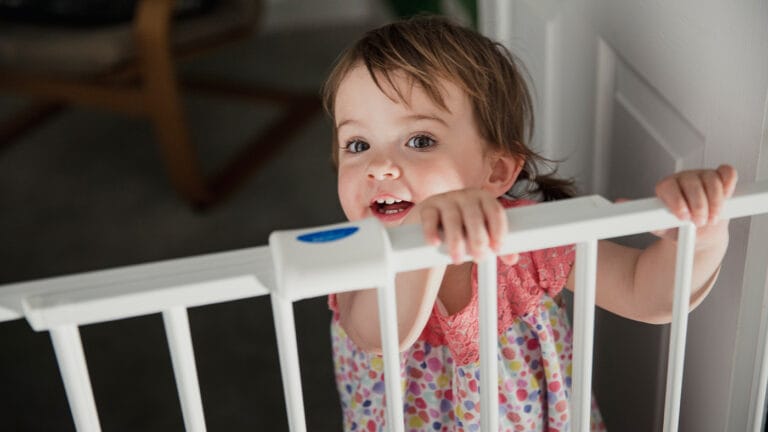Maybe you’ve got a kindergartner preparing to start school or a toddler getting ready to attend preschool or daycare for the first time, and everyone is feeling a little anxious about it. Dropping our babies off for their first day in the big world can be nerve-wracking for parents and kids alike. As they leave the safety of the nest, they can expect to experience a little bit of kindergarten separation anxiety.
When they’re very young, kids spend almost all of their time within eyeshot of their primary caregivers, often literally attached at the hip. As kids get older, they start enjoying independence, having new experiences, and gaining a fuller understanding of the world around them.
Separation anxiety is a normal part of growing up, but it will differ from kid to kid. Usually, separation anxiety peaks at around 18 months but can last through the elementary school years. Considering all of the new things your child is experiencing and the different people they are meeting during that period of life, you can expect a certain amount of separation anxiety. Patience, comfort, and love can help your kindergartner or preschooler manage separation anxiety.
What are the symptoms of separation anxiety in children?
While the exact cause of separation anxiety isn’t always apparent, it typically arises from a combination of biological and environmental factors. Some children may be genetically predisposed to anxiety, particularly if one or more parents are anxious people, and life events can also play a role. Suppose your child has experienced the loss of a loved one, the loss of a pet, moving houses, a divorce, or any other everyday life events. In that case, separation anxiety might be a normal response to the genuine loss that sometimes comes with separation.
If your child is feeling anxious before or during separation events, these are some of the symptoms they might display:
- Visible distress when thinking about being alone in the future
- Trouble sleeping – not wanting to sleep alone, waking up in the middle of the night, or recurrent dreams about separation
- Worrying about family members when they are away
- Crying, panicking, or tantrums when separating (dropping off at school, running errands, etc.)
Symptoms are relatively mild and subside after a few minutes most of the time. Despite the emotional fireworks on display, kids usually settle down and settle in shortly after their primary caregivers leave the room. In some instances, symptoms may be more severe and indicate a separation anxiety disorder of childhood.
A separation anxiety disorder is characterized by frequent, prolonged symptoms that hinder your child’s ability to live their life. Your child may exhibit intense worry when away from family members, worry that they won’t be reunited, or that something bad will happen while they are away. Other symptoms may include:
- Expressing worry about illness, disaster, kidnapping, or being lost
- Not wanting to go to school or leave the house for any reason
- Exceptional clinginess
- Frequent stomach aches or headaches
- Tension and/or muscle aches
How to Help With Separation Anxiety
Separation anxiety in four-year-olds looks different than separation anxiety in 18-month-olds. The correct response to separation anxiety will differ depending on your child’s age, severity of symptoms, temperament, and other factors. Help your child overcome their fear and create smoother transitions with these tips.
1) Encourage age-appropriate independence from a young age.
Let your child safely explore their environment without constant supervision. Pay attention to your child’s behavior and responses before, during, and after these times to help identify situations or triggers so you can prepare for and work through them.
2) Talk about your feelings with your child so they learn to recognize and express emotions in healthy ways.
Read books about feelings together and express your feelings openly in age-appropriate ways. Establish a routine and, whenever possible, keep things consistent. Routines help kids learn what to expect and help avoid potential moments of panic.
3) Take baby steps.
Start with brief separations, like leaving your child alone in their room for 15 minutes or leaving them with a trusted friend while you run down the street. By showing them in small, bite-sized chunks of time, you can help them see that they are safe and that you will come back.
4) Don’t prolong goodbyes.
Giving your child an extra long hug or just one more pep talk before you leave may be tempting, but that might do more harm than good. Letting them cling might reinforce the idea that something bad will happen when you are away. Communicate clearly, with love, and leave.
5) Make future plans.
Before you separate, communicate what will happen later. Letting your child know that “after school, I will pick you up, and we will go home” or “when I get back, we can play a game together” might be all your child needs to feel safe, secure, and reassured while you are away.
6) Ease transitions whenever possible.
Introduce your child to new people in communal gatherings. Meeting the new babysitter together before you leave on date night might prevent your child from feeling like they’ve been left with a stranger. When it’s time to start daycare, preschool, or kindergarten, go to the open house or back-to-school night together so your child can explore the building, meet the teachers, and maybe even make some friends while their trusted adults are nearby. While you’re there, engage with teachers and other supporting adults so your child can see you interacting with those they can trust to give them additional support and encouragement.
As painful as it can be to see your child upset, separation and the anxiety that comes with it are growth opportunities. Before you know it, you’ll miss the days they wouldn’t let you out of their site!





